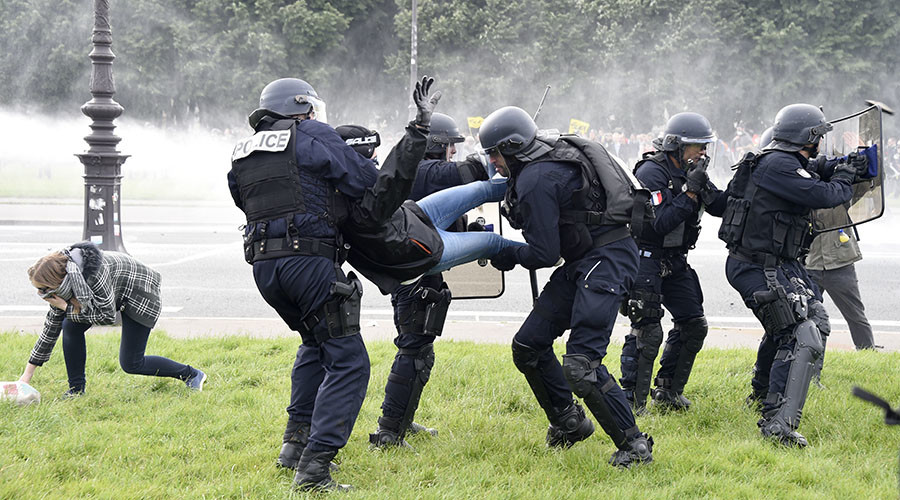Alwaght-Strikes and riots have become the order of the day across France in protest over a planned change of labor laws that would make hiring and firing easier.
In the most recent incident, on June 14, things turned especially nasty in Paris, when around 75,000 demonstrators gathered in Paris. At least 40 people were injured, including 29 police officers, and 58 people were arrested.
Demonstrators had gathered outside the government building where the Senate was debating changes to the labor law. The people of France are protesting over these proposed changes, which they say will destroy hard-earned worker’s rights.
In the proposed labor law, the 35-hour work week remains in place in theory, but firms can also negotiate with local trade unions on more or fewer hours, up to a maximum of 46 hours. The proposed law also gives companies greater freedom to reduce pay and lay off workers. Basically firms will take on more employees if they know they can easily lose them in case of a downturn. Another contentious point in the proposed labor law is that employers will have more flexibility to approve or deny holidays or special leave, such as maternity leave.
Known as the El Khomri law, after the labor minister, the legislation has given birth to an entire protest movement, Nuit Debout, which has been likened to Occupy in the US, but enjoys broader support in France. Early May, President Francois Hollande and Prime Minister Manuel Valls decided to use their constitutional powers to impose the labor law reforms by decree lower house of parliament without a vote.
The decision to invoke special constitutional powers underlines the deep rifts running through the ruling Socialist Party a year ahead of presidential elections and Hollande's own weakness ahead of declaring whether he will run for re-election.
Hard line trade unions and a bloc of traditionalist Socialist politicians – including several former ministers and the Mayor of Paris, Anne Hidalgo – oppose the changes. So do 70 per cent of French people.
French workers are furious at this attack on their rights. Demonstrations against the bill began on March 9 and led to a massive demonstration on March 31, when nearly 400,000 people came out in protest across France. The country has now been under a state of emergency for six months and fatigue is setting in.
France has seen many strikes, but there has not been anything like this disruption since May 1968, when student-led demonstrations shut down the entire country for six weeks.
This is also different because the Socialist Party is divided amongst itself. When the Socialist Prime Minister, Manuel Valls, decided to reform the labor code by removing a few layers of worker protection, many of the Party members considered his move a heresy.
The Conféderation Générale du Travail (CGT), France’s oldest and biggest union is leading the protests. With the goal of having the reformed law thrown out entirely, the union has organized strikes by train drivers, the picketing of ports, power stations and fuel depots, and national days of action.
The labor protests are taking place after two terrorist attacks in 2015 which shook the country. As if that was not enough recent rains that have caused havoc across central Europe, including in France, where the river Seine burst its banks and Le Louvre shut down so that its employees could move artwork to a place of safety.
It was expected that Euro 2016, the European Soccer Championship, that kicked off on June 10 that is expected to bring nearly w million visitors to France would lift some of the malaise gripping the country. However, things seem to have gotten worse following incidents of traditional by English and Russian fans. On June 15, UEFA, the governing body of soccer in Europe, threatened to disqualify England and Russia over hooliganism.
Meanwhile President Hollande has proposed to ban demonstrations in France, according to his presidential spokesman, who said that at a time when the country is plagued by terrorism, the conditions are not in place to protect “personal or public property."
"At a time when France is hosting the Euro 2016 [football tournament], when it is faced with terrorism, demonstrations can no longer be authorized if property, people and public property cannot be safeguarded," Hollande told a Cabinet meeting on Wednesday, according to his spokesman Stephane Le Foll.
Apparently, the new law will eventually pass in some form, but first there will be grappling between the two houses of the government. Next year will bring a presidential election and Hollande’s chances of winning a second term are almost non-existent; elected on a left-wing program, he has reneged on his campaign promises.
With Hollande’s prospect of re-election looking increasingly remote, the battle for the main opposition’s nomination in November is shaping up as the real contest. That’s why the race has already drawn 11 candidates, including two former prime ministers, with an ex-president, Nicolas Sarkozy, hovering undeclared on the sidelines.
It is quite clear that anti-labor law protests in France have grown into something more far-reaching and long-lasting, with people saying they are rallying against capitalism and intolerance.



























